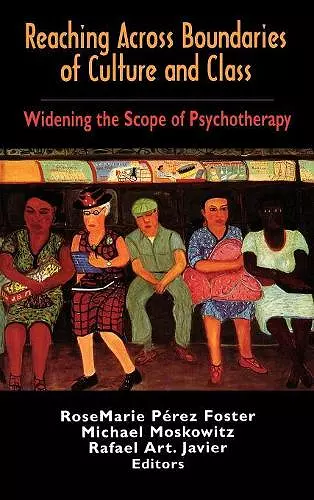Reaching Across Boundaries of Culture and Class
Widening the Scope of Psychotherapy
RoseMarie Perez Foster editor Michael Moskowitz editor
Format:Hardback
Publisher:Jason Aronson Publishers
Published:1st Jun '96
Currently unavailable, and unfortunately no date known when it will be back

In a world that is forever fragmenting into divisions of ethnicity and class, this groundbreaking book offers an approach to therapy that reaches across the boundaries that usually divide us. Reaffirming psychotherapy's roots in a progressive approach to social change, the contributors show how contemporary methods can be used to treat patients often previously thought unresponsive to psychodynamic therapy. Cultural values, countertransference guilt, immigration, bilingualism, and battered self-esteem in African-American patients are among the many topics discussed. Numerous examples guide the clinician to a better understanding of the role of culture in the therapeutic relationship. A Jason Aronson BookIn a world that is forever fragmenting into divisions of ethnicity and class, this groundbreaking book offers an approach to therapy that reaches across the boundaries that usually divide us. Reaffirming psychotherapy's roots in a progressive approach to social change, the contributors show how contemporary methods can be used to treat patients often previously thought unresponsive to psychodynamic therapy. Cultural values, countertransference guilt, immigration, bilingualism, and battered self-esteem in African-American patients are among the many topics discussed. Numerous examples guide the clinician to a better understanding of the role of culture in the therapeutic relationship.
This book is long overdue. It brings to the forefront the need to have a transcultural perspective in doing psychodynamic therapy. The authors demonstrate that the self-understanding offered through psychodynamic therapy is indeed accessible when practiced by culturally informed practitioners. All psychotherapists who practice in our multicultural society should read this book. -- Alvin F. Poussaint M.D., Harvard Medical School
This book is brave and ambitious, yet clearheaded. The editors and contributors understand that if psychoanalysis is to have any use or moral purchase in treating ethnic and class diversity in contemporary culture, it must recover and reaffirm its radical and social roots. A psychoanalytic theory and practice sensitive to issues of class, ethnicity, poverty, and economic and social suffering must be socially critical, self critical, and above all deeply psychoanalytic. A nice paradox: a theory sensitive to diversity and specific social crises yet committed to the universality of unconscious process, transference phenomena, and complex intrapsychic process as the source of illness and of healing. -- Adrienne Harris Ph.D., New York University
This book usefully highlights class and cultural dimensions, too often neglected in our literature, if not in our best practice. It has value as a significant extension of an inherently contextual methodology, neither revisionist nor necessarily inimical to its scientific aim. * Psychoanalytic Books: A Quarterly Journal Of Reviews *
ISBN: 9781568214870
Dimensions: 238mm x 164mm x 27mm
Weight: 581g
275 pages